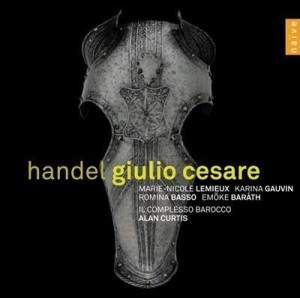I never thought I’d say such a thing, but the world did not need another recording of Giulio Cesare. Including DVDs, there are more than a dozen available, some of which are bordering on the magnificent, with both mezzos and countertenors as Cesare, high sopranos and mezzos as Cleopatra, etc. The list of singers and conductors reads like a Who’s Who in Baroque practice. This new set boasts fine singers, some known, some new to me, with a distinguished conductor and orchestra as well, but somehow it does not come near the Pantheon.
Cesare is a long opera—almost four hours—and it makes huge demands on its singers, particularly the two leads, each of whom has eight (!) arias. Handel composed the title role for the great castrato, Senesino, and my preference always has been for a countertenor in the part—David Daniels, Lawrence Zazzo, Andreas Scholl—though my absolute favorite recorded Cesare is the mezzo-soprano Jennifer Larmore (under René Jacobs), so clearly I can be persuaded. I also think Sarah Connolly (from Glyndebourne) is magnificent.
Here we have the superb Marie-Nicole Lemieux, a dark-toned, fluent, involved contralto who can sing both agile and pathetic music with great feeling and handsome tone. You would guess that the role would suit her ideally, but it does not: her register breaks are awkward and she overstates the text at times, perhaps to make up for genuine flexibility in the dazzling passages. Perhaps Larmore has spoiled me—she alone among mezzos has both the rhythmic verve (greatly assisted by Jacobs’ stupendous leadership) and vocal arrogance to portray the great warrior/Cesare as well as the beautiful, even tone for the lover/Cesare. Under most circumstances Lemieux would be considered perfectly grand, but Larmore and Connolly, not to mention the countertenor Cesares, are extraordinary circumstances.
I fear I’m having the same reaction to Karina Gauvin’s Cleopatra. Forget that Beverly Sills always will be the be-all and end-all in this role, over-decorating, incorrect orchestration and all. Gauvin is a singer I have great admiration for, and here, most of the time, she is exquisite—the tone glorious and correctly sensual for the character, the coloratura just about perfect. “Non disperar” is performed about as perfectly as you’ll ever experience it; “Piangero” is somewhat of a drive-by. She lacks tragedy in the darker arias. Handel plumbs the depths of emotions throughout the arias and Gauvin does not affect us as she ought to at Cleopatra’s most disheartened.
I have to acknowledge that part of the fault I’m finding in Lemieux and Gauvin, which I’ve never encountered with them before, must be laid at the feet of Alan Curtis. The playing of his Il Complesso Barocco is flawless—strings that can be both spicy and warm, woodwinds that comment brilliantly on the action, and in general, great playing. But he, Curtis, is a bit of a bore. You can hear it most in the recits that never catch fire; he treats them like filler and seems to lose the natural pattern of speech they can so well display. It may explain the lack of chemistry between the leads as well. Individual arias shine, but the overall effect is not organic: the entire drama slows down at times, as if inspiration and interest had just dropped dead.
Elsewhere we are also in mixed hands: the choice of Emöke Barath, a soprano, rather than the usual mezzo as Sesto is not felicitous. Barath is a fine singer but Sesto is an impetuous boy/man and Barath’s lighter sound makes him sound merely petulant. And her embellishments, which take the vocal line higher most of the time, only add to the problem. Cornelia is the character in the opera whose moral center is unimpeachable; she has great dignity. This can make her a bit dull, but Romina Basso’s rich contralto and passionate delivery make us wait for her every entrance. Filippo Mineccia, a (properly) countertenor Tolomeo, is very good, but the middle of his voice disappoints. The Achilla, baritone Johannes Weisser, previously only heard as René Jacobs’ Don Giovanni, makes as much as possible of his role. Nirono is miscast with a mezzo rather than a countertenor.
And so: Who knows whether or not both Gauvin and Lemieux might have been more stimulated by a more centered conductor? As it stands, if you were to own this recording, you’d be pleased, but only if you didn’t know what you were missing. Jacobs’ is still the best; but even the reassigning of parts, cuts, and messy arrangements of the RCA performance under Julius Rudel can’t dim Beverly Sills’ luster.
































